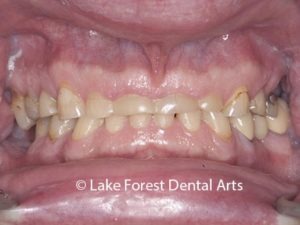
Many people clench and grind their teeth occasionally, which causes little harm. However, frequent teeth grinding, medically called bruxism, can damage teeth and lead to other health complications. Many people suffer from bruxism without even realizing it. Stress, anxiety, an abnormal bite, and misaligned teeth are some reasons people grind and clench their teeth.
Because they are unaware of the issue, they don’t seek help until damage has already been done. Because many people grind their teeth at night, they are unaware of their condition.
Causes of Bruxism
The exact causes of bruxism can be difficult to determine, especially for patients who only grind their teeth at night. But, a few possible causes are:
- There is a direct genetic link to the predisposition to grind your teeth
- Crooked teeth or jaw misalignments
- Damage to the jaw’s joints or muscles, commonly referred to as TMJ
- Excessive stress
- Anxiety disorders – Anxiety and stress are thought to escalate grinding not really cause it
- Side effects of medications or medical conditions
The Effects of Bruxism
Thankfully there are many warning signs that bruxism might be an issue. If you notice any of these symptoms you should consult us immediately, as there are several measures we can take to help prevent further damage to your teeth. Without assistance, however, it can be very difficult to end subconscious, nighttime teeth grinding.
- Sore cheeks and temples
- Chronic headaches, especially when you wake up in the morning
- Pain while chewing
- Changes in the teeth’s alignment
- Unusually sensitive teeth
- Short teeth as a side effect of excessive wear
Children grind their teeth
According to WebMD, 30-50% of children grind their teeth. When their baby teeth emerge, many babies grind their teeth to relieve pain as part of the teething process. Another peak time for teeth clenching is when children lose baby teeth, and their permanent teeth start to erupt. These situations are temporary in most cases, but children whose bruxism creates malocclusion between the upper and lower jaws are more likely to continue bruxing into adulthood. Often, children unknowingly grind their teeth while sleeping, like many adults. A thorough checkup can reveal tell-tale signs of tooth wear on molars.
A harmful habit
Bruxism is hard on your jaw joints, or temporomandibular joints (TMJs), located directly in front of your ears. These joints attach your lower jawbone, or mandible, to your skull on the temporal bone. Grinding and clenching your teeth during sleep places great force, equal to hundreds of pounds, on your teeth. Many people are less likely to grind during daylight hours because they will not tolerate the same amount of force while they are awake.
Chronic bruxism can lead to TMJ disorder, in which the jaw joints no longer find a true resting position. In this case, muscles work overtime to hold the jaw in proper position day and night. As a result, muscle spasms, which cause bruxism – the problem is cyclic.
Severe grinding may wear down teeth, causing them to appear short and stubby. Chronic grinding and clenching can also result in fracturing, chipping, loosening, or loss of teeth. In some cases, crowns can build up back teeth to re-equilibrate the bite and restore proper occlusion.
For bruxers, ligaments around the TMJs can become damaged and inflamed, which can lead to muscle spasms, as well as neck and shoulder pain. The inner ear is separated from the TMJ by millimeters, so problems with your TMJs can cause earaches, tinnitus, or ringing in the ears.
Signs and symptoms of bruxism
Bruxism can be tricky to self diagnose, since people often grind and clench their teeth at night and are unaware of their destructive habit.
- You suffer from headaches or migraines after waking in the morning
- You slept all night but are still fatigued
- Neck pain when you wake up
- Ringing in your ears
- Joint or jaw pain is common
- Your jaw muscles are tired
- Your sleeping partner notices that you are grinding
- You find yourself clenching your teeth during the day
Your teeth can also offer signs of night time grinding and clenching. If Dr. Fondriest finds that your teeth appear ragged, chipped, worn down, fractured, or sharp, you may suffer from TMJ disorder.
Treatments for Bruxism
Stress is a leading cause of bruxism, so reducing stress may help you stop grinding your teeth. Be sure to get plenty of sleep, exercise regularly, and eat a nutritious diet to keep stress levels low. Avoid smoking, recreational drugs, alcohol, and caffeine. Be sure to relax your jaw by closing your lips, while keeping your teeth apart by placing the tip of your tongue slightly between them. While these tactics may help, chronic teeth grinding often requires professional intervention. You’ll want a dentist with special training in bruxism and TMJ treatment, like Dr. Fondriest.
Most likely, the dentist will recommend a custom fitted dental night guard, a smooth plastic appliance (or splint) that fits over upper teeth. Professional mouth guards are recommended over appliances you may buy at the drug store. Over the counter splints aren’t as effective. A custom-made dental night guard eliminates your ability to hurt your teeth during sleep. Protecting your teeth and jaw joints with a mouth guard is much preferable than using muscle relaxants.
If your teeth have been heavily worn down, your dentist will recommend getting them repaired.
Rebuilding teeth with veneers or crowns may be necessary in instances where teeth have worn down and led to malocclusion. Rebuilding teeth may restore the natural resting position of the TMJs.
About the Author: Dr. Fondriest had extensive training in TMJ therapy at the world renowned L.D. Pankey Institute, where he now works as a senior faculty member. To schedule a consultation or for diagnosis and treatment of your problem with a TMD expert, call us at (847) 234-0517.
